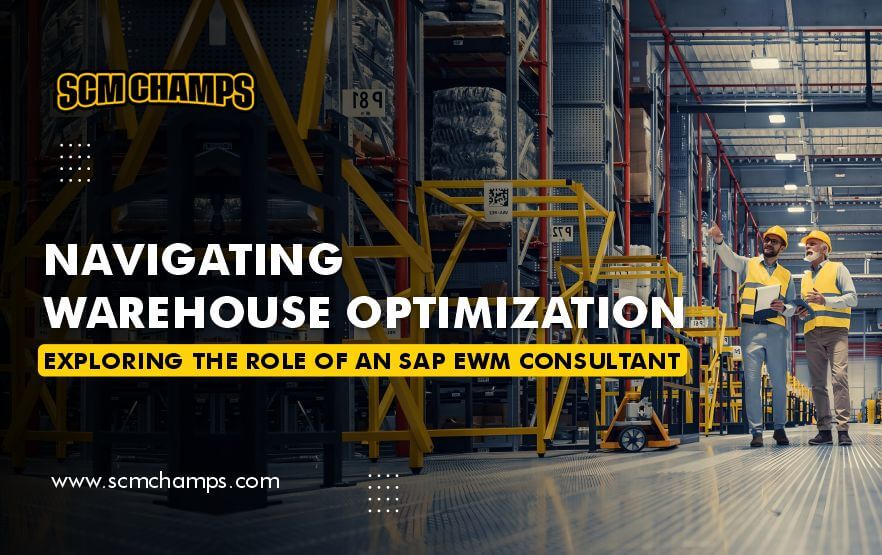
The Crucial Role of an SAP EWM Consultant in Streamlining Warehouse Operations
Introduction: In today’s fast-paced business environment, effective warehouse management plays a pivotal role in ensuring smooth operations and customer satisfaction. SAP Extended Warehouse Management (EWM) has emerged as a leading solution for optimizing warehouse processes.
However, the successful implementation and utilization of SAP EWM heavily rely on the expertise of a skilled consultant. In this article, we will explore the significant role an SAP EWM consultant plays in streamlining warehouse operations and achieving operational excellence.
Role of SAP EWM Consultant in Optimizing Warehouse Operations
Understanding the Basics of SAP EWM:
To grasp the importance of an SAP EWM consultant’s role, it is essential to have a basic understanding of SAP EWM itself. SAP EWM is a comprehensive warehouse management system that integrates with other SAP modules, enabling businesses to efficiently manage their inventory, streamline picking and packing processes, optimize storage space, and enhance overall warehouse productivity.
Project Planning and Implementation:
One of the primary responsibilities of an SAP EWM consultant is to work closely with the organization’s management and stakeholders to develop a comprehensive project plan for implementing SAP EWM.
This involves analyzing existing warehouse processes, identifying pain points, and designing a tailored solution that aligns with the company’s goals and requirements. The consultant ensures a smooth transition from legacy systems to SAP EWM, minimizing disruptions to daily operations.
Configuration and Customization:
After the project planning phase, the SAP EWM consultant is responsible for configuring and customizing the system to meet the specific needs of the organization.
This includes defining storage bin structures, setting up material types, configuring inbound and outbound processes, and establishing rules for picking, packing, and shipping. By leveraging their expertise, the consultant ensures that the system is optimized to maximize efficiency and accuracy throughout the warehouse.
Training and Knowledge Transfer:
Implementing SAP EWM successfully requires a well-trained workforce capable of utilizing the system’s full potential. An SAP EWM consultant conducts training sessions for warehouse personnel, equipping them with the necessary skills and knowledge to operate the system effectively.
They provide guidance on best practices, process flows, and troubleshooting techniques, empowering the organization’s employees to become proficient users of SAP EWM.
Continuous Improvement and Support:
The role of an SAP EWM consultant extends beyond the initial implementation phase. They play a crucial role in monitoring system performance, identifying opportunities for improvement, and recommending enhancements to further optimize warehouse operations.
Additionally, consultants provide ongoing support, addressing any technical issues or user queries that may arise. This ensures that the organization continues to derive maximum value from SAP EWM over time.
Integration and Collaboration:
An SAP EWM consultant works closely with other modules within the SAP ecosystem, such as SAP ERP, SAP Transportation Management, and SAP Quality Management. They ensure seamless integration between these modules, enabling efficient data exchange and fostering collaboration across different departments. This integration enhances visibility, accuracy, and overall coordination across the entire supply chain.
Staying Up to Date with Trends and Innovations:
Technology is constantly evolving, and so is SAP EWM. An SAP EWM consultant stays abreast of the latest industry trends, updates, and innovations in warehouse management. They attend conferences, participate in training sessions, and continuously upgrade their skills to provide cutting-edge solutions to their clients.
By leveraging their expertise and staying ahead of the curve, consultants ensure that organizations can take advantage of emerging technologies and stay competitive in the market.
Conclusion:
The role of an SAP EWM consultant is instrumental in streamlining warehouse operations and achieving operational excellence. From project planning and implementation to configuration, customization, training, and continuous improvement, their expertise guides organizations toward efficient warehouse management.
Read also: How to Streamline Warehouse Operations with SAP EWM?
By harnessing the power of SAP EWM, businesses can optimize their inventory, improve order fulfillment, and enhance overall customer satisfaction. With an experienced SAP EWM consultant by their side, organizations can unlock the full potential of their warehouse operations and stay ahead in today’s competitive business landscape.


